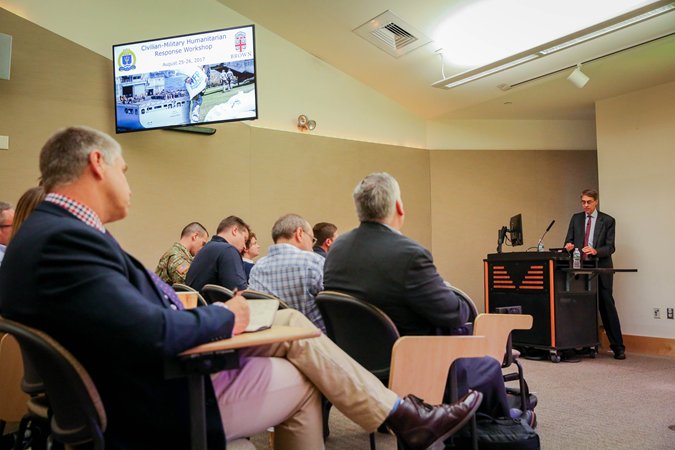Naval War College, Brown University host Humanitarian Response Workshop

PROVIDENCE, R.I. – An international group of academics, military members and humanitarian response practitioners attended the Civilian-Military Humanitarian Response Workshop co-hosted by Brown University in Providence, Rhode Island, and U.S. Naval War College (NWC) Newport, Rhode Island and held on the Brown campus, Aug. 25-26.
The conference was co-hosted by Brown University’s Humanitarian Innovative Initiative (HI2), part of the school’s Watson Institute for International and Public Affairs. This is the second civilian-military (civ-mil) humanitarian response event between the schools. The first one was held October at NWC.
The workshop focused on humanitarian aspects to help the U.S. military, international militaries, United Nations Office for the Coordination of Humanitarian Affairs, humanitarian organizations, and academia develop new research ideas, professional education, training aspects, and development agendas to improve civ-mil coordination during humanitarian crises. The workshop centered around eight working groups that focused on different aspects of civ-mil coordination.
Professor Dave Polatty, director of NWC’s Civilian-Military Humanitarian Response Program and co-chair of the event, said these discussions are important to all organizations that respond to humanitarian emergencies and operate in the same locations.
“For the second year in a row, we were honored to host so many leading experts from around the world who routinely operate in the civil-military humanitarian ecosystem,” said Polatty. “We added more than 30 new participants from last year, working together to tackle important issues such as pandemics, urbanization, climate change, attacks on aid workers, global health engagements, information communication and remote sensing technologies, ethics and gender, and civil-mil coordination during conflict. It was inspiring and heartwarming to see so much progress being made since our first conversation last October.”
Similar to the October workshop, this session had four specific goals that each of the working groups focused on: enhancing the response capacity of various key organizations; expanding networks of humanitarian response practitioners, academics, and leaders; highlighting key opportunities for decision makers of different roles to identify best practices; and developing a comprehensive research agenda on civ-mil coordination.
The workshop was unique because many of the participants from last time were able to continue their work and discussions.
Adam Levine, director of the HI2 and workshop co-host, was extremely pleased with the outcome of the conference.
“The workshop brought together over 100 participants from humanitarian organizations, UN agencies, domestic and foreign militaries, and academic institutions to tackle some of the most pressing humanitarian challenges worldwide,” said Levine. “It was an honor for our Humanitarian Innovation Initiative to be able to host such a dynamic group of individuals here at Brown University, and a pleasure to partner with the Naval War College Humanitarian Response Program in organizing it.”
Michael Marx, senior civ-mil coordination advisor for the UN Office for the Coordination of Humanitarian Affairs who helped facilitate the event, agrees with the impact of the conference.
“This follow-on workshop to our event last October has continued to build trust and relationships within the humanitarian ecosystem, as well as promote important dialogue for some of the most challenging areas humanitarians are working in. This continuing discussion will better enable us respond more efficiently and predictably in the future,” said Marx.
The workshop included attendees from organizations such as Brown University’s Humanitarian Innovation Initiative, Providence, RI; Harvard University, Cambridge, Mass.; Massachusetts Institute of Technology (MIT), Cambridge, Mass; MIT Lincoln Laboratory, Lexington, Mass.; University of Rhode Island, Kingston, RI; Stanford University, Palo Alto, Calif.; University of Oxford, England; Yale University, New Haven, Conn.; U.S. Military; Center for Excellence in Disaster Management and Humanitarian Assistance; Uniformed Services University; various medical facilities; private industry, humanitarian organizations; the International Committee of the Red Cross; Brigham and Women's Hospital; Hartford Hospital, Conn.; The Carter Center, Atlanta, Georgia; U.S. Agency for International Development’s Office of Foreign Disaster Assistance; and the United Nations Office for the Coordination of Humanitarian Affairs.
About this News Article
Article Information
August 30, 2017
Most Recent
News, Media, & Events
U.S. Naval War College's 2023 Newport Arctic Scholars Study Integrated Naval Deterrence in the Arctic Region
Feb. 10, 2023
News Publication
NWC Alumni Serve as Delegates to International Seapower Symposium 25
Sep. 25, 2023
News Publication
Lectures of Opportunity: "The Role of Operational Energy in National Security"
Feb. 24, 2025
12:00 PM
U.S. Naval War College, 686 Cushing Rd, Newport, RI 02841
Chairman of the Joint Chiefs of Staff Delivers Lecture at U.S. Naval War College
Nov. 21, 2024
News Publication
